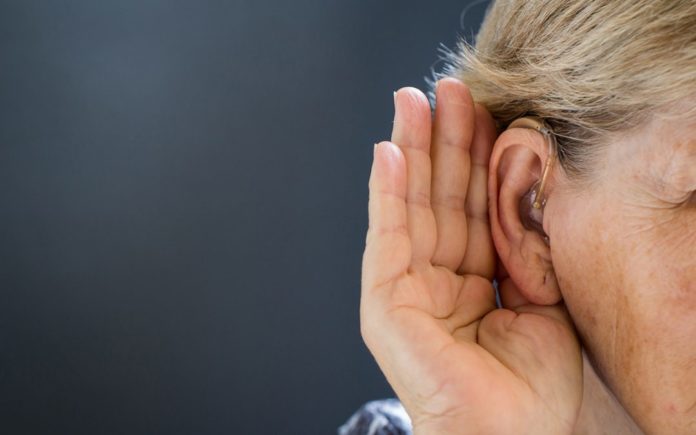If you’re asking people around you to repeat themselves more often or finding yourself turning up the television louder than usual, you’re not alone. It’s estimated that 48 million Americans have lost a significant portion of their hearing.1
The bad news is that hearing loss is expected to become even more common in the coming decades. Even kids and teens are experiencing hearing loss at an alarming rate. It’s estimated that 12.5% of minors have sustained hearing damage, and the leading cause is listening to loud music through their earbuds.2
Despite these alarming statistics, there is some good news! New evidence suggests that hearing loss can be slowed, stopped, and even reversed with the right diet and supplements.
Causes of Hearing Loss
But first, what causes us to lose our hearing in the first place? We’ve always been told it’s due to noise, and that damage accumulates over time. Whether it’s workplace noise from tools or machinery, frequently going to concerts, or wearing earbuds to listen to chat on the phone or listen to podcasts, the vibrations from these noises can destroy the sensitive hair cells in the inner ear.
These cells are responsible for converting soundwaves into nerve impulses that the brain can interpret. Sadly, once these are destroyed, they can’t be regenerated (there are other species other than mammals that can restore these cells).
Other potentially preventable causes of hearing loss include:
- Diet – Processed foods and sugar can result in the production of harmful free radicals that damage all the cells in your body, including your inner ear. However, since these don’t regenerate, the effects of a poor diet on hearing loss are more pronounced.
- Exposure to chemicals – Pesticides, industrial chemicals, lead, and mercury have all been linked to hearing loss. One of the most common ways humans are exposed to mercury is through amalgam fillings, which contain mercury.3 Dentists still use this material to fill cavities, though it is beginning to fall out of favor. If you still have fillings with mercury, talk to your dentist about having them removed.
- Prescription drugs – Both prescription and over-the-counter medicines have been shown to damage hearing in humans.4 The most harmful are:
- Painkillers such as aspirin, acetaminophen, and NSAIDs (non-steroidal anti-inflammatory drugs)
- Antibiotics
- Chemotherapy drugs
- Hormonal replacement therapy
- Oral contraceptives
- Antimalarial drugs
Natural Ways to Restore Your Hearing
While a hearing aid can improve your ability to hear and communicate, it won’t “cure” hearing loss.
To protect and restore your hearing naturally, one of the best things you can do is load up on antioxidants. These compounds inhibit oxidation, which leads to the production of free radicals. You’ve probably heard the term “free radicals” before in skincare commercials. They’re the culprit in a lot of biological breakdowns, including aging and diseases like diabetes and cancer.
A study published in the Journal of Otology & Neurology5 recommended this regime to battle hearing loss:
- Vitamin C
- Vitamin E
- Vitamin A
- Vitamin B12
- Alpha-lipoic acid
- Magnesium
- Omega-3 fatty acids (fish oil)
- Zinc
- Gingko Biloba
Supplementing with Vitamins A, C, E, and magnesium (or better yet, getting them from food) helps prevent free radical damage and can even help reduce the damage done to your ears after exposure to a sudden loud noise, like a screeching concert or a gunshot.6
In addition to those vitamins and minerals, having plenty of Vitamin B12, alpha-lipoic acid, zinc, and omega-3s in your diet or supplement routine is a key preventative measure to protect against further hearing loss. In one study, being sufficient in these nutrients cut the risk of age-related deafness in half.7
And finally, Ginkgo Biloba, though often associated as a natural memory aid to prevent Alzheimer’s, is also a powerful antioxidant. It improves blood circulation to the ears, delivering vital nutrients and protecting its function. Doctors recommend taking 30-200mg daily.8
Bottom Line: The ability to hear is something we tend to take for granted. Seeing its decline can be stressful and scary. You might start to wonder how loud you’ll eventually have to turn up the television volume, and if you’ll ever be able to have a normal conversation. Taking preventative action can help, and even if you’ve begun suffering the effects of hearing loss, you can potentially stop or reverse the trend with smart dietary and supplement choices.
Note: This content is not intended to be a substitute for professional medical advice. Nor is it a diagnosis or treatment. Always seek the advice of your physician or another qualified health provider with any questions you have about hearing loss prevention and restoration before beginning a supplement regimen.
- https://www.webmd.com/a-to-z-guides/hearing-loss-causes-symptoms-treatment#1
- https://www.healthyhearing.com/report/52500-Hearing-loss-among-kids-and-teens
- https://articles.mercola.com/sites/articles/archive/2010/09/06/how-to-convince-the-fda-to-ban-mercury-fillings–a-winnable-strategy.aspx
- https://www.ncbi.nlm.nih.gov/pubmed/17308839
- https://www.ncbi.nlm.nih.gov/pubmed/12851547
- https://www.ncbi.nlm.nih.gov/pubmed/17395018
- https://www.ncbi.nlm.nih.gov/pubmed/20534742
- https://www.ncbi.nlm.nih.gov/pmc/articles/PMC3451083/








